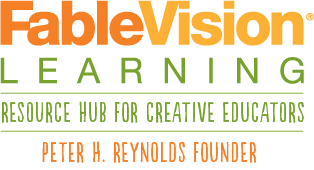3 Ways Creativity Principles Can Fuel Self-Acceptance
By Sara Smith, Director of Creative Education at FableVision Learning
As educators and caregivers, we want to help children develop a strong sense of self. We know fostering a healthy self-image is vital for a child's overall well-being. Fortunately, the science of creativity offers us three valuable principles that not only promote creative thinking but also help build confidence, resilience, and self-worth.
1. Embracing Divergent Thinking: Quieting the Inner Critic
At the heart of creativity lies divergent thinking – the ability to generate many, varied ideas. Part of divergent thinking is deferring judgment, or waiting to evaluate our ideas until we have fully explored the possibilities and allowed ourselves to freely express our imagination without fear of criticism or limitation.
Teaching children how to defer judgment means encouraging them to quiet that inner voice that tells them their ideas aren't good enough. It means not being dismissive when they express ideas that may be silly or impossible. It looks like asking for their thoughts and ideas and being willing to try out new ways of doing things based on their contributions. It sounds like responding to them with genuine curiosity and interest. Modeling openness and acceptance is the best way to instill it in our young ones.
Not only does this principle create a climate of openness and acceptance, but it can also teach children to love and accept themselves. As students learn to silence their inner critic and embrace their originality, they begin to cultivate an appreciation for their own ideas and capabilities. As they remain open to the beauty of new ideas when ideating, they learn to be open to the beauty of who they are and the uniqueness they bring to the world.
2. Affirmative Judgment: Focusing on the Positives
In the creative process, we do need to eventually evaluate and converge on our ideas. Here, affirmative judgment plays a crucial role. When we engage in affirmative judgment, we focus on what’s right, what’s good, and what’s positive about ideas rather than immediately jumping to all that is wrong or impossible. This keeps us focused on how to move forward rather than feeling defeated.
Encouraging children to look at their ideas and their work with an affirmative perspective builds their self-worth and self-acceptance. When students become practiced in seeking out the positives, they are more able to see their own strengths and best qualities.
Children hear the way we talk about ideas, about others, and about ourselves. To stock their self-management toolbox, they need to witness affirmative judgment from us. They need to hear us tell others what we appreciate about them; they need to hear us talk about what we care about and then watch us seek it out; they need to hear us express our own strengths with pride. They also need to hear us say good things about them, because the way we talk about them becomes their self-talk, and positive self-talk is one of the most powerful tools for improving our self-image.
3. Embracing the Iterative Process: Reframing Mistakes
Creativity is a journey that can be messy and full of obstacles and setbacks. Fumbles and failures inevitably require us to go back and try again a little differently, over and over. Accepting that as part of the process allows us to be resilient when we run into issues or things don’t go as we hoped or expected.
Our lives are also creative projects. When we can view ourselves from a creative perspective, we see that, of course, mistakes and missteps are going to be part of the process of being a person. Knowing this gives us permission to forgive ourselves, recognize our potential, and pick back up and continue trying.
Apply this principle by reminding the children in your life of the times they were resilient and persevered. Tell them about times you made mistakes and learned from them. Reassure them that they are wonderful and loved, even when they’ve messed up.
Creativity serves as a powerful tool in nurturing self-acceptance in children, providing them with the skills and mindset needed to navigate the hard parts of being human. By fostering a culture of creativity that celebrates uniqueness and expects iteration, we empower children to appreciate their imperfections, embrace their strengths, and to see themselves as the valuable humans they are.
Did you know that FableVision Learning offers an online Creative Educator Certification Program? At the end of this year-long certification program you will be prepared to teach creatively, nurture the creative spirit of your students, and practice the tools and skills of creativity in the classroom.
Sara Smith is the Director of Creative Education at FableVision Learning. Sara is an experienced K-12 educator, creativity facilitator and curriculum designer. She is an amateur but enthusiastic ukulele player and improv actor. She earned her master's degree in creativity from SUNY College at Buffalo. Now she works with FableVision Learning to inspire creative thinking in teachers and students through professional development and joyful learning experiences. She lives in Charlotte, NC, where she can happily and unabashedly use the word y'all.





